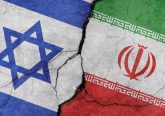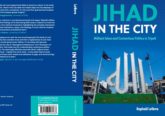Personal, unmediated contact between the West and the Middle East is at an all time low, according to Egyptian tycoon and art collector, Shafik Gabr. His eponymous foundation has responded with an initiative sponsoring exchanges between ‘future leaders’ of the West and the Middle East in an effort to build real person-to-person relations. The UK launch at London’s Dorchester Hotel on November 15th aimed to start defining the deficiencies and potential for real dialogue between the West and the Middle East.
The aesthetic backdrop to this endeavour takes the form of Gabr’s exquisite collection of Orientalist art. Much as the art does demonstrate that contact took place between Western traveller painters and local Egyptians, Algerians and Tunisians, the paintings themselves are easy to criticise as a form of West-West communication, mediating how the ‘Other’ is seen and generally stamped ‘exotica’. However, there is more to it than that. Consider John Frederick Lewis’ A Frank Encampment in the Desert of Mount Sinai (1842) (below), which depicts an Englishman, Viscount Castlereagh, reclining in Arab dress, visited at his Bedouin-style camp by an uncomfortable-looking Sheikh Hussein, the actual lord of the area.

Castlereagh assumes his presence and superiority naturally, but more than that, his garb and dwelling show that he also considers that he understands the Other. Sheikh Hussein looks uncomfortable, not least because, in real life, sitting for his portrait went against his Islamic beliefs and he was bribed with a gift of weapons in order to do so – but also presumably because it is his land, after all. His erect figure in the centre of the image discredits the lounging Castlereagh, making the latter seem absurd. For Castlereagh cannot see himself relating to the Other, he has only seen and judged enough of the Other to copy his clothing, but he has not listened, and certainly not noticed that he is trespassing. The presence of the dragoman, the stooped figure meaningfully placed between Hussein and Castlereagh, tells us that contact between the two is mediated through a translator: there is no direct dialogue or mutual understanding. This piece of exotica is actually a critique, and sets a poignant tone for contemplating dialogue between the West and the Middle East today, with its messy history of misunderstandings, assumed asymmetry and dependence upon mediation.
Beginning the day’s spoken agenda with thoughts on current affairs, the Right Honourable Tony Blair answered questions about dialogue in his capacity as the Representative of the Office of the Quartet. The agenda was set by the situation in Gaza and consequent thoughts on Israel and Palestine as the definitive case study for East-West dialogue and lack of understanding. Blair declares, “I’m an optimist” and points to how the case of Northern Ireland illustrates that “you can’t give up.” “I hope that it de-escalates” is all he has to say about the then ongoing Israeli military action in Gaza. Speaking more broadly, Blair insists, “politics only takes you so far; if there isn’t real person-to-person contact, it’ll never work.” He refers to the One Voice programme in Israel that brings Palestinian and Israeli youth together to show that the current situation is “not hopeless”, though it remains difficult to get a hold of. The key to a meaningful dialogue, Blair asserts, is that the people at the table have a credible sense that a solution is possible. While that sense may be wanting in the Israeli-Palestinian case, nonetheless, Blair says, “there isn’t an alternative to getting back around a table.” The key factors for bringing about that discussion are that Palestinians realise that statehood is only attainable by negotiation, borders must be agreed upon, changes on the ground must support policies rather than work against them, and the wider region must play a role. This is the standard current hand dealt for the ever-changing, but ever-stagnant game of Israeli–Palestinian dialogue.
The wider upheavals in the region clearly vex Blair, who, while somehow remaining an optimist about as yet illusory progress on Israeli–Palestinian matters, is very cautious about the results of the revolutions in the rest of the Middle East. “People must realise that democracy is not just a way of voting, but a way of thinking,” he says, stressing that it is as important how minorities are treated as that the majority are empowered, that this includes basic equalities between groups, and between
men and women. The only positive way forward for Blair would entail the creation of genuine, open-minded societies with peoples who are willing to live with each other despite their differences. Blair posits tolerance for social diversity as a precondition for democracy and it forms the crux of his current scepticism for the transitions of post-Arab Spring nations. The ideal is hard to fault in essence, but would seem to have potential purchase far beyond Egypt’s new situation.
Thoughts flowed on to the current turmoil in and between Syria, Lebanon and Turkey and whether it raises the question: ‘does the Middle East understand itself? And is it knowable at all to the West?’ Blair did not consider the refusal to talk with Assad when the latter offered dialogue a missed opportunity, but rather sees the removal of Assad as a necessary precondition for initiating new relations with the Syrian people. While UN missions come and go, and non-engagement with the Assad regime may be of dubious use, at least the rebels are talking to each other. The issue of carefully picking one’s partners for dialogue was also raised by Sir Graeme Lamb, former Commander of the UK Field Army at Land Command and Deputy Commanding General of the Multi-National Force-Iraq. Lamb made the point that with some people, such as the upper echelons of Al-Qaeda, there was no possibility of fruitful dialogue because they refused to see any other point of view or understand any other way of life. This, as well as Assad’s refusal to step down, shows the dangers of entrenching one’s own reality to the exclusion of others.
While means of communication have proliferated and sped up in the modern era, current media do not always live up to their ‘social’ classification. Carina Kamel of Al-Arabiyya TV explained that, while people are no longer just consumers of media, what they do consume, they can do so selectively so as not to hear any views that may contradict with their own. This results in the danger of a world that is not better connected, but rather more fenced into its own opinions and with more extreme views than before. There appears to be nothing inherent in current times that does away with that age old preference for mediated contact with the Other in line with existing prejudices. Sir Sherard Cowper Coles, former ambassador to Israel and Saudi Arabia and former Special Representative to Afghanistan and Pakistan, was keen to point out that Middle Eastern drive to discover their Western Other was generally very widespread, noting that a Saudi minister had lent him Israeli novels in preparation for his move to Israel. What he argued was lacking was a visible effort vice versa. Would an Israeli minister read Arab literature? Would a member of the United States Congress? He went on to lambast the many members of Congress who do not have passports; a fact symptomatic of a political class whose influence extends far beyond its experience and whose views of the East are formed solely from second-hand sources – ‘West–West dialogue’ – telling each other what they already think. Cowper Coles’ quip that one solution might be to block Fox News’ signal elicited applause.
Lamb also shared an anecdote about the crucial difference between negotiations and dialogue. Attempting to start dialogue with Iraqi leaders during the Allied Forces’ occupation of Iraq and subsequent Iraqi rebellions, Lamb’s translator – not his usual translator, who was excellent, Lamb was keen to add – used the Arabic for ‘negotiations’ when Lamb had said ‘dialogue’ in English. This had those present almost going to guns; fortunately the translation was quickly rectified and violence narrowly avoided. Rather than just underlining the importance of linguistic nuance, this anecdote brings to mind a vignette resembling Lewis’ painting – only with more weaponry.
Over-reliance on mediation and entrenched pre-formed opinions not based on real, first-hand experience can, therefore, be very dangerous. This hearkens back to Blair’s ideals for real change in the Middle East: the need for open-minded societies that know and tolerate differences and are able to interact without conflict. This is indeed a worthy – if obvious – ideal for post-revolutionary Egypt, as it would be for Israelis and Palestinians, but it is as applicable to the West and how it sees itself in relation to the East. Current dialogues can still look too much like that depicted by Lewis in 1842. The possibilities for an exchange programme need to address the caveat in Lewis’ painting: going and seeing is not enough, speaking the language and listening to the Other is the critical element of real dialogue. Hussein Fahmy, the famous Egyptian actor, put this rather dramatically, “you need to submit”, he insisted – accept the Other as they are first, and the exchange that follows will be that between equals: real dialogue.
Lucy Thirkell is a PhD candidate in Politics and International Studies at the University of Cambridge. She is the Managing Editor of the Cambridge Review of International Affairs.







1 Comment
Fantastic Post. Thanks for share. Much more wait .. …